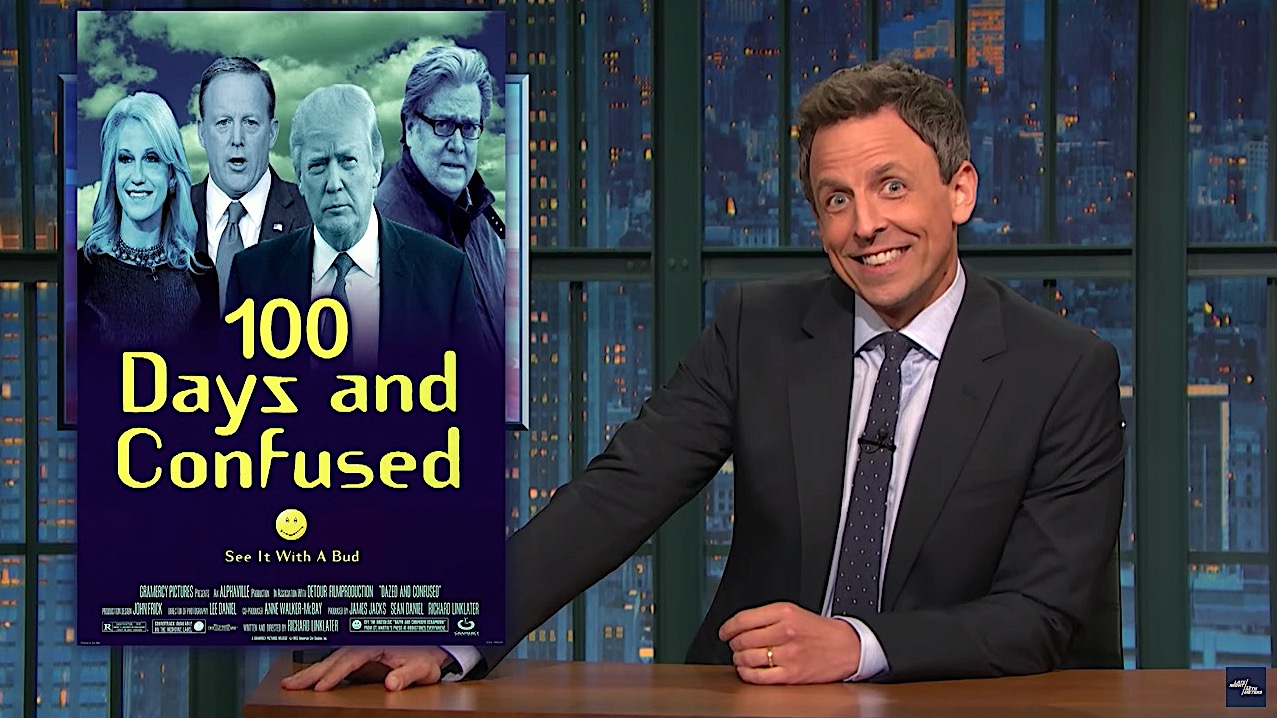Seth Meyers gives President Trump his first report card: 100 Dayz and Confused


A free daily email with the biggest news stories of the day – and the best features from TheWeek.com
You are now subscribed
Your newsletter sign-up was successful
"President Trump has been scrambling for literally any kind of positive achievement as he nears the end of his first 100 days in office," Seth Meyers said on Monday's Late Show. The 100-day mark, of course, "is traditionally when presidents get their first big report card on their performance so far, and this will shock you, most people think he's not doing great," Meyer said. None of Trump's promised actions by Day 100 are done. "If this were a movie, it would be called 100 Dayz and Confused," he said. And yet, "like every terrible student, Trump is trying to turn an F into an A."
Trump is kind of right that "the 100 Day report card is an arbitrary, meaningless political milestone that most people don't actually care about," Meyers said, but Trump obviously does, having pitched a laundry list of things he would accomplish by Day 100. He's accomplished none of them, leaving him to brag about TV ratings and his electoral victory. "How could things get any worse?" Meyers asked. A government shutdown, of course. But Meyers was concerned if the government does shut down, nobody would even notice: "Under Trump our federal government is staffed as well as a Duane Reade on a Sunday morning."
Still, whether or not the government is open come Saturday rests on whether Trump will veto a spending bill without funding for his border wall. Wasn't Mexico going to pay for that wall? On Twitter, Trump said it still will, somehow, at some point in the future. "Trump's tweets are starting to sound like the fine print on a contest to win a free cruise," Meyers said. And how much will the wall cost? "Even the biggest sucker at the used car lot" would walk away, given Trump's delightfully obtuse answer to The Associated Press.
The Week
Escape your echo chamber. Get the facts behind the news, plus analysis from multiple perspectives.

Sign up for The Week's Free Newsletters
From our morning news briefing to a weekly Good News Newsletter, get the best of The Week delivered directly to your inbox.
From our morning news briefing to a weekly Good News Newsletter, get the best of The Week delivered directly to your inbox.
Meyers actually gets a lot of mileage out of Trump's freewheeling AP interview, but his parting shot came from Trump's glowing platitudes about his first 100 days delivered on camera last week. "That's the president of the United States saying 'government is coming along really well,'" Meyer said. "That's like going home to your wife and saying, 'Hello, wife, our marriage is coming along really well.'" Watch below. Peter Weber
A free daily email with the biggest news stories of the day – and the best features from TheWeek.com
Peter has worked as a news and culture writer and editor at The Week since the site's launch in 2008. He covers politics, world affairs, religion and cultural currents. His journalism career began as a copy editor at a financial newswire and has included editorial positions at The New York Times Magazine, Facts on File, and Oregon State University.
-
 Political cartoons for February 13
Political cartoons for February 13Cartoons Friday's political cartoons include rank hypocrisy, name-dropping Trump, and EPA repeals
-
 Palantir's growing influence in the British state
Palantir's growing influence in the British stateThe Explainer Despite winning a £240m MoD contract, the tech company’s links to Peter Mandelson and the UK’s over-reliance on US tech have caused widespread concern
-
 Quiz of The Week: 7 – 13 February
Quiz of The Week: 7 – 13 FebruaryQuiz Have you been paying attention to The Week’s news?
-
 ‘One Battle After Another’ wins Critics Choice honors
‘One Battle After Another’ wins Critics Choice honorsSpeed Read Paul Thomas Anderson’s latest film, which stars Leonardo DiCaprio, won best picture at the 31st Critics Choice Awards
-
 Son arrested over killing of Rob and Michele Reiner
Son arrested over killing of Rob and Michele ReinerSpeed Read Nick, the 32-year-old son of Hollywood director Rob Reiner, has been booked for the murder of his parents
-
 Rob Reiner, wife dead in ‘apparent homicide’
Rob Reiner, wife dead in ‘apparent homicide’speed read The Reiners, found in their Los Angeles home, ‘had injuries consistent with being stabbed’
-
 Hungary’s Krasznahorkai wins Nobel for literature
Hungary’s Krasznahorkai wins Nobel for literatureSpeed Read László Krasznahorkai is the author of acclaimed novels like ‘The Melancholy of Resistance’ and ‘Satantango’
-
 Primatologist Jane Goodall dies at 91
Primatologist Jane Goodall dies at 91Speed Read She rose to fame following her groundbreaking field research with chimpanzees
-
 Florida erases rainbow crosswalk at Pulse nightclub
Florida erases rainbow crosswalk at Pulse nightclubSpeed Read The colorful crosswalk was outside the former LGBTQ nightclub where 49 people were killed in a 2016 shooting
-
 Trump says Smithsonian too focused on slavery's ills
Trump says Smithsonian too focused on slavery's illsSpeed Read The president would prefer the museum to highlight 'success,' 'brightness' and 'the future'
-
 Trump to host Kennedy Honors for Kiss, Stallone
Trump to host Kennedy Honors for Kiss, StalloneSpeed Read Actor Sylvester Stallone and the glam-rock band Kiss were among those named as this year's inductees
